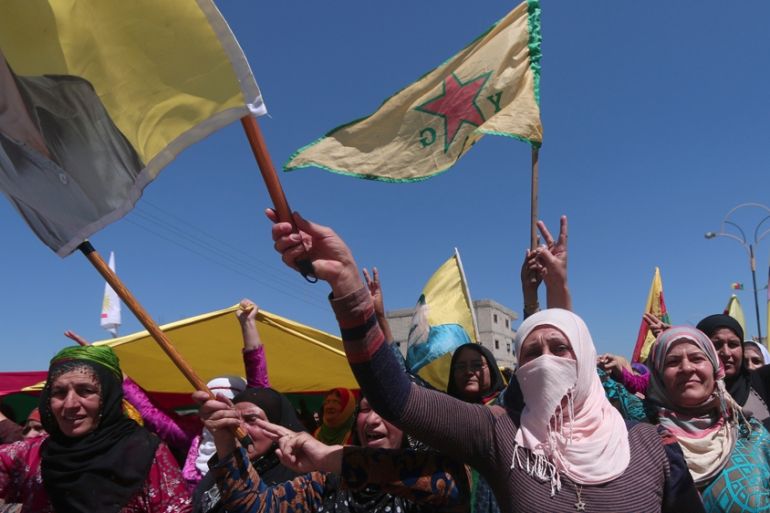Syrians vote in Kurdish-held northern region
Elections begin three-phase process to set up new governing institutions that aim to secure regional autonomy.

Syrians have voted in an election organised by the Kurdish-led authorities of northern Syria, the start of a three-phase process to set up new governing institutions that aim to shore up regional autonomy.
“Today comes as a historical day for us. The people are choosing their way of life, politics, economy,” Renas Ahmed, 25, said on Friday. He was among dozens of people casting their vote for the local community representatives being elected.
Keep reading
list of 4 itemsTurkey hits 71 targets in Iraq, Syria in retaliation for soldiers’ deaths
Turkey says bombers came from Syria, threatens more cross-border strikes
‘Iraqis love life’: In conversation with Ala Talabani
Voters were picking leaders for some 3,700 “communes” spread across three regions of the north where Kurdish groups have established autonomous rule since 2011, when Syria’s civil war erupted.
Friday’s poll will be followed in November by votes for local councils polls and culminate in January with the election of an assembly that will act as a parliament for a federal system of government in northern Syria.
|
|
The election points to the ambitions of Kurdish groups and their allies that control close to a quarter of Syria.
Their stated aim is to secure autonomy as part of a decentralised Syria, and insist they do not want to follow the example of the Kurds of northern Iraq who are due to vote in an independence referendum on Monday.
But their autonomy plans are opposed by the Syrian government in Damascus, by neighbouring Turkey and by Washington – even though the United States is fighting alongside the Syrian Kurdish YPG armed group in the war against the Islamic State of Iraq and the Levant (ISIL, also known as ISIS).
The government, which is winning back territory from rebel and hardline groups such as ISIL with help from Russia and Iran, has pledged to recover all of Syria. The YPG and Damascus have mostly stayed out of each other’s way in the war.
But tensions between Damascus and its allies on the one hand, and the YPG and its allies on the other are surfacing as they race to capture Deir Az Zor province in eastern Syria from ISIL.
‘First time I vote’
“This is the first time I vote,” said Mohamad Murad Khalil, a man in his late 50s who was one of tens of thousands of Syrian Kurds denied citizenship by the Syrian state.
“I lived 60 years without nationality. We couldn’t breathe, we were denied all civil rights. [But] it’s not like before when they could oppress us,” he said.
“We have strength, will, an army – everything, thanks to God, the YPG and the YPJ,” he said referring to the all-female militia affiliated to the YPG, whose flag was flying at the polling station.
The political structures expected to emerge from the process are inspired by the ideas of Abdullah Ocalan, head of the Kurdistan Workers Party (PKK), who is in jail in Turkey for leading a three-decade rebellion.
Turkey views the political rise of Syria’s Kurds as a threat to its national security.
The dominant Syrian Kurdish political groups, centred around the PYD – the Democratic Union Party – say their system embraces all ethnic and religious groups in northern Syria.
READ MORE: Enemy of Enemies – The Rise of ISIL
But the YPG has faced hostility from the Syrian Arab groups that have fought President Bashar al-Assad in the six-year-long civil war. They accuse it of working with Assad against them – something the YPG denies.
The YPG is fighting ISIL as part of a US-backed armed group alliance known as the Syrian Democratic Forces (SDF), which includes fighters from Arab and other backgrounds.
But the elections are not going ahead in all of the territory captured from ISIL by the SDF: the majority-Arab cities of Manbij and Tabqa near Raqqa are not part of the new political order, though they may have the option of joining it.
Though the areas where the elections are taking place are predominantly Kurdish, Naser al-Jasim, 45, an Arab from Qamishli, said his village was taking part.
He said he was casting a vote to improve local services and to show “that unlike what narrow-minded people think, there is no difference between a Kurd and an Arab.”
Advances in Raqqa
The SDF said in a statement on Wednesday that it had started a new offensive against ISIL on the northern edge of Raqqa.
This was “a feature of the final stages of the Euphrates Wrath campaign, which is nearing its end”, the statement said. “We can say that 80 percent of the city of Raqqa has been liberated.”
The SDF group spent months encircling the city before entering it in June and sealing off all access routes.
OPINION: Decolonising Syria’s so-called ‘queer liberation’
The UK-based Syrian Observatory for Human Rights said on Wednesday that the alliance had taken more than 90 percent of the city, adding that the major remaining hurdle for its forces was a large concentration of mines in the area.
ISIL seized Raqqa in early 2014, transforming the city into the de facto Syrian capital of the “caliphate” it declared after taking control of large parts of Syria and Iraq.
It quickly became synonymous with the group’s most gruesome atrocities, including public beheadings, and ISIL is thought to have used the city to plan attacks abroad.
In recent months, ISIL has seen the territory under its control diminish quickly.
|
|